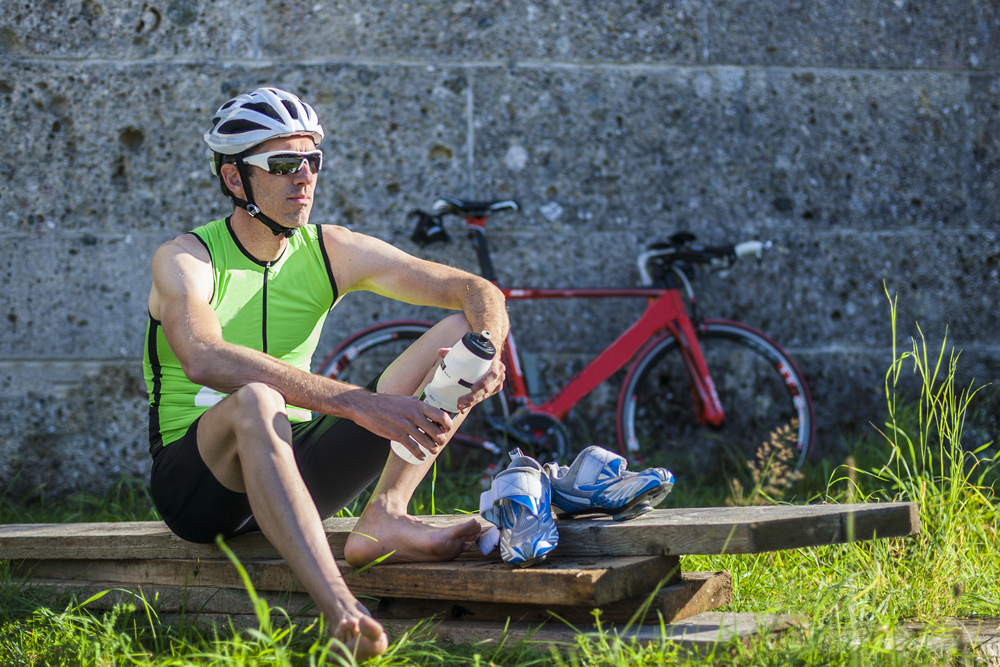One of the biggest mistakes athletes make after completing a triathlon is not resting enough and jumping back into heavy training or exercise too soon.
If you’re a seasoned triathlon then you know what it’s like to want to try and participate in as many as you can when race season comes along, however, insufficient recovery time in between races can easily result in poor performances or even injuries.
The time you should take to rest after completing a triathlon will depend on what kind of triathlon you’ve completed, with some demanding longer recovery times than others.
In general, the shorter the triathlon race, the less time you will need for recovery and the quicker you’ll be able to resume your regular training. If you’ve never completed a triathlon before then you may find you need to spend longer resting to let your body recover fully.
For a sprint distance triathlon, you’ll only need about 5 to 7 days to let your body recover before resuming your normal training again. You should rest completely for 2 days and then begin exercising lightly for under an hour each time throughout the week until your body feels ready.
If you’ve been brave enough to take part in the Ironman 140.6 Triathlon then it can take up to 21 days for your body to fully recover and you should ideally take as long as a week of complete rest before even thinking about resuming light exercise.

During the recovery period, you should make sure all bike rides, swims, and runs are less than 2 hours and don’t rush yourself into getting back into your regular triathlon training.
If you make sure you pace yourself during the race, then you’ll recover quickly.
If you go too hard too early on, then you’ll struggle through the later stages of the race and your body will quickly become sore.
Pacing yourself doesn’t mean settling for slower race times as if you pace your efforts through each stage of the race you’ll be able to stretch out your energy for the entire race resulting in a quicker time.
If you don’t have long enough between triathlons to let your body fully recover the way it needs, then there are other things that you can do that will boost your recovery and help your body feel as back to normal as possible ready for your next race.
One way to help your body recover as quickly as possible is by getting as much quality sleep as you possibly can. Try to aim for 7 to 9 hours a night to help your muscles repair themselves and aid your body to recover from the stress associated with high-intensity racing.
Many triathletes use natural melatonin supplements to fall asleep faster and get a better night's sleep.
If your work schedule or personal life cannot allocate this much sleep in the night, then try to fit in 20-minute power naps throughout the day to help get in as much rest as possible.
A key way to help optimize your triathlon performance and the recovery process is fueling your body with nutritious food and also staying as hydrated as possible.
Try to get as much protein as possible after finishing your race and make sure your meals are balanced with good protein and healthy carbohydrates. Muscle Milk is an efficient and safe way to dramatically boost your protein intake, which will help heal your muscles for your next race.
If you can spend time massaging your own muscles with a foam roller or with a massage gun or get a professional sports massage. This will help promote blood flow and also help stop your muscles from becoming too stiff and painful.
If you’re willing to, you could try getting into an ice bath after your race and/or subsequent workouts to reduce the swelling in your body and help reduce the muscle damage.
Once you've had your short period of complete rest, it’s important to try and do some regular light exercise like walking or cross-training to keep your muscles moving so they don’t seize up.
Try doing some light yoga to stretch out your body and to keep it supple.
If you’re unsure of how long you should take to recover after completing a triathlon, or maybe you’re unsure of what exercises to help aid your recovery process, then you could try enlisting the help of a triathlon coach who will be able to build a program catered to your fitness levels and triathlon lengths to get you back on track with your training as soon as possible.
How do you balance triathlon training
Training for a triathlon can be tricky to balance alongside work commitments and personal life, so one of the best ways to make sure you keep on track with it is by planning efficiently by either having a trainer or by writing out a training regime for each week and upcoming months up until race day.
You should try to dedicate two hours a week to each triathlon discipline so planning and writing down each session is the best way to fit everything in.
To avoid being unprepared, try to start your training early and try to incorporate your training into your everyday life, for example, try cycling to work and or dedicate the weekends to long cycle sessions as this is when you’ll have the most time.
Whilst balancing training alongside other commitments in your life, it’s important to prioritize yourself otherwise you risk exhaustion which will negatively impact your training performance and result in you being unprepared for the big race day.
You should try to identify any limitations you have in some disciplines as soon as possible in your training so you can work and improve on them.
